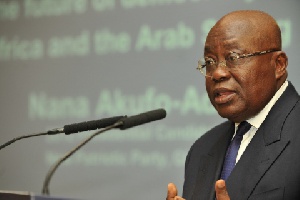Professor Albert Adu-Boahen, presidential nominee for the New Patriotic Party (NPP) in the 1992 elections, fought for the free open democratic society Ghana is enjoying at the moment, and that showed his bravery and courage, Nana Addo Dankwa Akufo-Addo, flagbearer of the NPP, has said.
During the 10th anniversary public lecture organised by the Adu-Boahen Foundation with support from some stakeholders and the family of the late academic and politician in Accra on Tuesday, May 24, Mr Akufo-Addo gave account of how Prof Adu-Boahen contributed to Ghana’s democracy despite the threat he faced at the time and praised the courage he exhibited to strengthen the NPP.
He told the gathering: “We are here to celebrate undoubtedly one of the great figures of modern Ghana; a scholar statesman. His influences on our times have been tremendous. The free open democratic society that he fought for with such courage and eloquence is today very much at the centre of our national fabric.
"Adu-Boahen has a lot to do with where we are today. It has made it possible that within a decade we have witnessed two changes of government from one democratically elected government to another, something which looked inconceivable in the early years of our history.”
A close friend to Adu-Boahen and veteran journalist, Cameron Duodu, who delivered the keynote address, acknowledged the role the late professor played in harnessing Ghana’s democracy.
Mr Duodu added: “He inspired a lot of people and when I heard that he has passed, I sent messages to two newspapers, the Guardian and the Independent in the UK, offering to write about him. So, I had the task of writing about him for the two newspapers. There was so much to write about him. I was also able to write two long articles for New African magazine and they published it. He gave an example to show that we all have a role to play in making our society better. The bravery he brought into politics was not the only one. He was extremely courageous when it came to intellectual affairs.”
The late professor was born in Osiem to Presbyterian parents, and had his ancestral roots in Juaben-Asante. He attended religious schools between 1938 and 1947. He then spent three years at Mfantsipim School before enrolling in history studies at the University College of the Gold Coast in Legon.
He graduated in 1956. In 1959 he received a Ph.D. in African History from the School of Oriental and African Studies in London, as the first Ghanaian.
He was employed at the University of Ghana in 1959, and was a professor from 1971 to his retirement in 1990. He chaired the Department of History there from 1967 to 1975, being the first African to do so, and was a dean from 1973 to 1975.
He also served on the editorial board of The Journal of African History published by Cambridge University Press, and was a visiting scholar at such institutions as the Australian National University in 1969, Columbia University in 1970, and the State University of New York in 1990 and 1991. Between 1993 and 1999, he also worked on the UNESCO committee that published the eight-volume work General History of Africa.
His academic work crossed over into politics. In February 1988 he publicly lectured on the history of Ghana from 1972 to 1987. Because of this, he is credited with breaking the so-called ‘culture of silence’ which marked the regime of President Jerry Rawlings, who had served continuously since 1981.
The lectures, originally held in the British Council Hall in Accra, were published in 1998 as The Ghanaian Sphinx: The Contemporary History of Ghana 1972-1987.
In 1990 he co-founded the Movement for Freedom and Justice, and served as its first chairman. The ban on political parties in Ghana was lifted in 1992. In the subsequent 1992 presidential election, Boahen was the New Patriotic Party’s nominee, with Roland Issifu Alhassan as his running mate for vice president.
Boahen lost to Jerry Rawlings, but received 30.4 per cent of the vote. Due to dissatisfaction with the ballot, which he alleged had been rigged, Boahen led his party to boycott the next Ghanaian parliamentary election in 1992. Boahen spoke out against Marxist history early in his career. Politically, he described himself as “a liberal democrat, a believer in the freedom of the individual, the welfare of the governed, and in private enterprise and the market economy”.
He was a member of the Ghana Academy of Arts and Sciences, and in 2003 a Festschrift Named Ghana in Africa and the World was released, edited by Toyin Falola. The UNESCO awarded him the Avicenna Silver Medal.
He died on May 24, 2006, the same day he turned 74. He left behind his wife Mary Adu Boahen and his five children. Jerry Rawlings was among the mourners that paid a visit to his family. He was honoured with a state funeral, and in June 2006 was posthumously awarded the Order of the Star of Ghana.
General News of Wednesday, 25 May 2016
Source: classfmonline.com

















